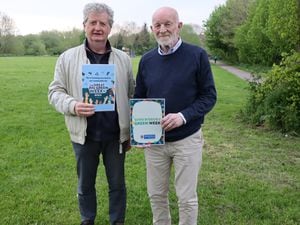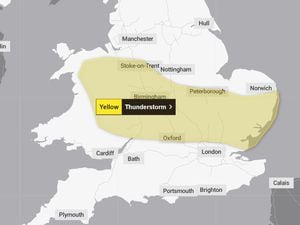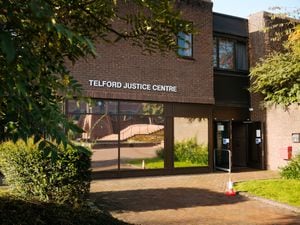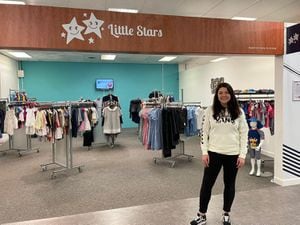Nostalgic trip for Lord David Blunkett as he returns to Shrewsbury - and he has some interesting views on current government policy
Former Secretary of State Lord David Blunkett returned to Shrewsbury, where in his youth he attended Condover School for the Blind.
Watch more of our videos on Shots!
and live on Freeview channel 276
Lord Blunkett, accompanied by his guide dog Barley, visited Sunflower House, Shrewsbury's Early Help Family Hub, on Thursday afternoon.
Still bearing the Sure Start sign - although no longer a Sure Start centre - the building stands in legacy to the one-stop shop family programme established back when Lord Blunkett was Education Secretary in 1999.
Labour’s second term in Government saw the Sheffield-born Blunkett appointed to the role of Home Secretary in 2001 serving in that role until 2004 and returning to the cabinet again in 2005.
But before his time in office, the Lord - then, just David - was educated in the Shropshire county town.
His visit to Shrewsbury this week was two-fold - firstly, to support the Labour prospective parliamentary candidate Julia Buckley, but also to "indulge in a bit of nostalgia" and celebrate almost 60 years to the week since he joined the Labour Party.

He explained: "It's the 60th anniversary of me joining the Labour Party in the Greenfield branch here in Shrewsbury. It's the first time I'd formally got involved, and look what's happened since.
"Nobody 60 years ago would have ever thought that this kid who couldn't see, who turned up that branch meeting would end up spending eight years in Tony Blair's Cabinet. So, you know, anything's possible for the people if they believe it.
"Education back in those days - and we're going back a very long time - was so very poor, a group of us went down to the local technical college and started to get what are now GCSEs.
"Gradually, over three years, some of us accumulated enough to give us the confidence to go on and get a job and do A Levels in the evening. But it took me six years to go to university - it was a long haul, but it started here."
With Labour’s landslide victory in the 1997 general election, Lord Blunkett was appointed Secretary of State for Education and Employment and was Britain’s first blind cabinet minister.
In his attempt to bring around Tony Blair's "education, education, education” priorities, as Education Secretary, Lord Blunkett oversaw widespread changes to the education system, including the introduction of over 100,000 teaching assistants and the doubling of spending per pupil.
During his time in Cabinet, the Government introduced the Sure Start programme which brought together early education, childcare, health and family support services for pre-school children and their families.
While most have now shut, a collection of 'Family Hubs' - including Sunflower House in Shrewsbury - remain.
The team at the Shrewsbury centre provide family support, health and wellbeing clinics, and signposting for dozens of young families in Shrewsbury each week.
Today, Lord Blunkett still emphasises the fundamental need for early years support.
He said: "Early intervention in early years is absolutely fundamental. Everybody plays page lip service to it but too often it gets lost and the resources are not applied early enough to stop things going very badly wrong.
"And that intervention, of course, is for the baby, for the child, but it's also for the family and for carers and the wider community, which was what Sure Start was all about.
"The centre here has hung on to the essence of Sure Start, with people working together and sharing the challenge together and the resource.
"With health and children's services and the multi-academy trusts and the local authority all working together, you might actually be able to intervene early enough to stop things from going badly wrong.
"There's a major concentration on social care for elders. But actually, the support and resources for early intervention and for children's services has been reduced just as heavily as it has for social care - and that gets forgotten."
At its peak in 2010, Sure Start received £1.8 billion a year (a third of overall early years spending), with around 3,600 centres across the country, but spending has since fallen by more than two-thirds with many centres being closed, scaled back or integrated into Family Hubs.
In 2020, it was reported that 1,300 centres had been closed during the previous decade - more than one in three Sure Start Centres.
"We need totally different accounting structure," Lord Blunkett argued, "so that we can see what benefit is gained from investment in the early years and in the family, which then stops the expenditure further down the line, which often you can never avoid.
"If somebody gets involved with the criminal justice system, and they end up in prison it costs an absolute fortune.
"If a youngster has major mental health problems and behavioural problems and they're not dealt with early it can cost tens of thousands of pounds a year - if not more. So it just makes sense to get it right from the beginning.
"But it's a long haul. We did our best and we made some progress 25 years ago, but then you think the water's closing in and you're going to start all over again and making it work."
As Lord Blunkett celebrated 60 years since joining the Labour Party, we asked him what he thought of the party's chances of winning over Shropshire's voters at the next general election.
He said: "I think that we've got to fight on for every single vote. I don't think there's any complacency about the challenge of turning around the result of the 2019 election.
"We have every hope, every aspiration of being able to take the seat, which will be crucial. But we took it back in 1997 and we can do it again."
Asking Lord Blunkett to don his former Home Secretary hat, we asked him about his views on the current Government's approach to the migrant situation.
Last week it was confirmed that The Lion Hotel on Wyle Cop would no longer be hosting asylum seekers that had been arriving since November 2022.
The decision to use a town centre hotel for asylum seekers has attracted protests and, in April 2023, a man got a suspended sentence after admitting causing racially aggravated criminal damage at the hotel.
Lord Blunkett said: "In the end, we need to get those who have a legitimate asylum claim processed through the system and get them into the labour market so that they can earn a living and contribute back into the community, and thereby look to rent and, eventually, perhaps by their own home.
"That should be where the resource goes. The National Audit Office came out with a report just two or three weeks ago, showing that the idea of putting asylum seekers in camps or on barges was by a factor of three more expensive than accommodating asylum seekers in hotels.
"It isn't a long-term solution, but nor is 100,000 plus in the waiting queue for being process. We need a dual approach."
Lord Blunkett argued the focus should be on reducing the backlog of those waiting for their asylum claims to be processed, and slammed the Government's Rwanda policy.
"I refuse to use the word illegal because it's a term that was invented in order to disqualify people coming to this country from even claiming asylum," he said.
"So the people who are coming now are not even counted as asylum seekers. They will be sent to Rwanda for processing and should they demonstrate that they are legitimate refugees they are not allowed to come back to the country, not even the right way.
"Not even the right-wing Prime Minister of Italy has put forward such a proposal. Their off-shoring results in legitimate asylum seekers being able to return to Italy. We're in a class of our own in terms of the way we're dealing with this."





